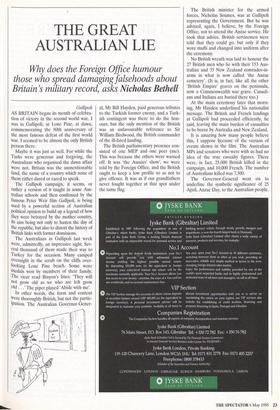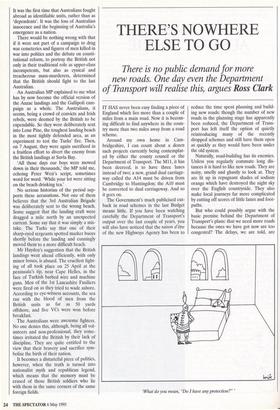THE GREAT AUSTRALIAN LIE
Why does the Foreign Office humour those who spread damaging falsehoods about
Britain's military record, asks Nicholas Bethell Gallipoli AS BRITAIN began its month of celebra- tion of victory in the second world war, I was in Gallipoli, at Lone Pine, at dawn, commemorating the 80th anniversary of the most famous defeat of the first world war. I seemed to be almost the only British person there.
Maybe it was just as well. For while the Turks were generous and forgiving, the Australians who organised the dawn affair were not. Britain was the unmentionable land, the name of a country which none of them either dared or cared to speak.
The Gallipoli campaign, it seems, or rather a version of it taught in some Aus- tralian schools and then confirmed by the famous Peter Weir film Gallipoli, is being used by a powerful section of Australian political opinion to build up a legend of how they were betrayed by the mother country, its aim being not only to hasten the day of the republic, but also to distort the history of British links with former dominions.
The Australians in Gallipoli last week were, admittedly, an impressive sight. Sev- eral thousand of them made their way to Turkey for the occasion. Many camped overnight in the scrub on the cliffs over- looking Lone Pine beach. Some wore medals won by members of their family. The vicar read Binyon's lines: 'They will not grow old as we who are left grow old . . The piper played 'Abide with me'. In other words, the form and content were thoroughly British, but not the partic- ipation. The Australian Governor-Gener- al, Mr Bill Hayden, paid generous tributes to the Turkish former enemy, and a Turk- ish contingent was there to do the hon- ours, but the only mention of the British was an unfavourable reference to Sir William Birdwood, the British commander of the ill-fated landing.
The British parliamentary presence con- sisted of one MEP and one peer (me). This was because the others were warned off. It was 'the Aussies' show', we were told by the Foreign Office, and the British ought to keep a low profile so as not to give offence. It was as if our grandfathers never fought together at that spot under the same flag. The British minister for the armed forces, Nicholas Soames, was at Gallipoli representing the Government. But he was advised, again, I believe, by the Foreign Office, not to attend the Anzac service. He took that advice. British servicemen were told that they could go, but only if they wore mufti and changed into uniform after the ceremony.
No British wreath was laid to honour the 27 British men who lie with their 153 Aus- tralian and 35 New Zealand comrades-in- arms in what is now called 'the Anzac cemetery'. (It is, in fact, like all the other `British Empire' graves on the peninsula, now a Commonwealth war grave. Canadi-. ans and Indians are buried there too.) At the main ceremony later that morn- ing, Mr Hayden underlined his nationalist message. The British and French landings at Gallipoli had proceeded efficiently, he said, leaving the main burden of casualties to be borne by Australia and New Zealand.
It is amazing how many people believe this, I suppose 4pcause of the version of events shown in the film. The Australian MPs and senators who were with us had no idea of the true casualty figures. There were, in fact, 25,000 British killed in the campaign, and 10,000 French. The number of Australians killed was 7,300.
The Governor-General went on to underline the symbolic significance of 25 April, Anzac Day, to the Australian people. It was the first time that Australians fought abroad as identifiable units, rather than as `dependents'. It was the loss of Australian innocence and the beginning of Australia's emergence as a nation.
There would be nothing wrong with that if it were not part of a campaign to drag war cemeteries and figures of men killed in war into politics and the debate on consti- tutional reform, to portray the British not only in their traditional role as upper-class incompetents, but also as cynical and treacherous mass-murderers, determined that the British should fight to the last Australian.
An Australian MP explained to me what has by now become the official version of the Anzac landings and the Gallipoli cam- paign as a whole. The Australians, it seems, being a crowd of convicts and Irish rebels, were deemed by the British to be expendable. So they were deliberately sent into Lone Pine, the toughest landing beach in the most tightly defended area, as an experiment to test the Turks' fire. Then, on 7 August, they were again sacrificed in a fruitless effort to divert the enemy from the British landings at Suvla Bay.
`All those days our boys were mowed down in their thousands,' the MP told me, echoing Peter Weir's script, sometimes word for word. 'While your lot were sitting on the beach drinking tea.'
No serious historian of the period sup- ports these accusations. Not one of them believes that the 3rd Australian Brigade was deliberately sent to the wrong beach. Some suggest that the landing craft were dragged a mile north by an unexpected current. Some say that it was simply a mis- take. The Turks say that one of their sharp-eyed sergeants spotted marker buoys shortly before the landing and cunningly moved them to a more difficult beach.
Mr Hayden's suggestion that the British landings went ahead efficiently, with only minor losses, is absurd. The cruellest fight- ing of all took place on 25 April at the peninsula's tip, near Cape Helles, in the face of Turkish barbed wire and machine guns. Men of the 1st Lancashire Fusiliers were fired on as they tried to wade ashore. According to eye-witness accounts, the sea ran with the blood of men from the British units as far as 50 yards offshore, and five VCs were won before breakfast.
The Australians were awesome fighters. No one denies this, although, being all vol- unteers and non-professional, they some- times irritated the British by their lack of discipline. They are quite entitled to the view that their bravery and sacrifice sym- bolise the birth of their nation.
It becomes a distasteful piece of politics, however, when the truth is turned into nationalist myth and republican legend, which means that the memory must be erased of those British soldiers who lie with them in the same corners of the same foreign fields.



































































 Previous page
Previous page